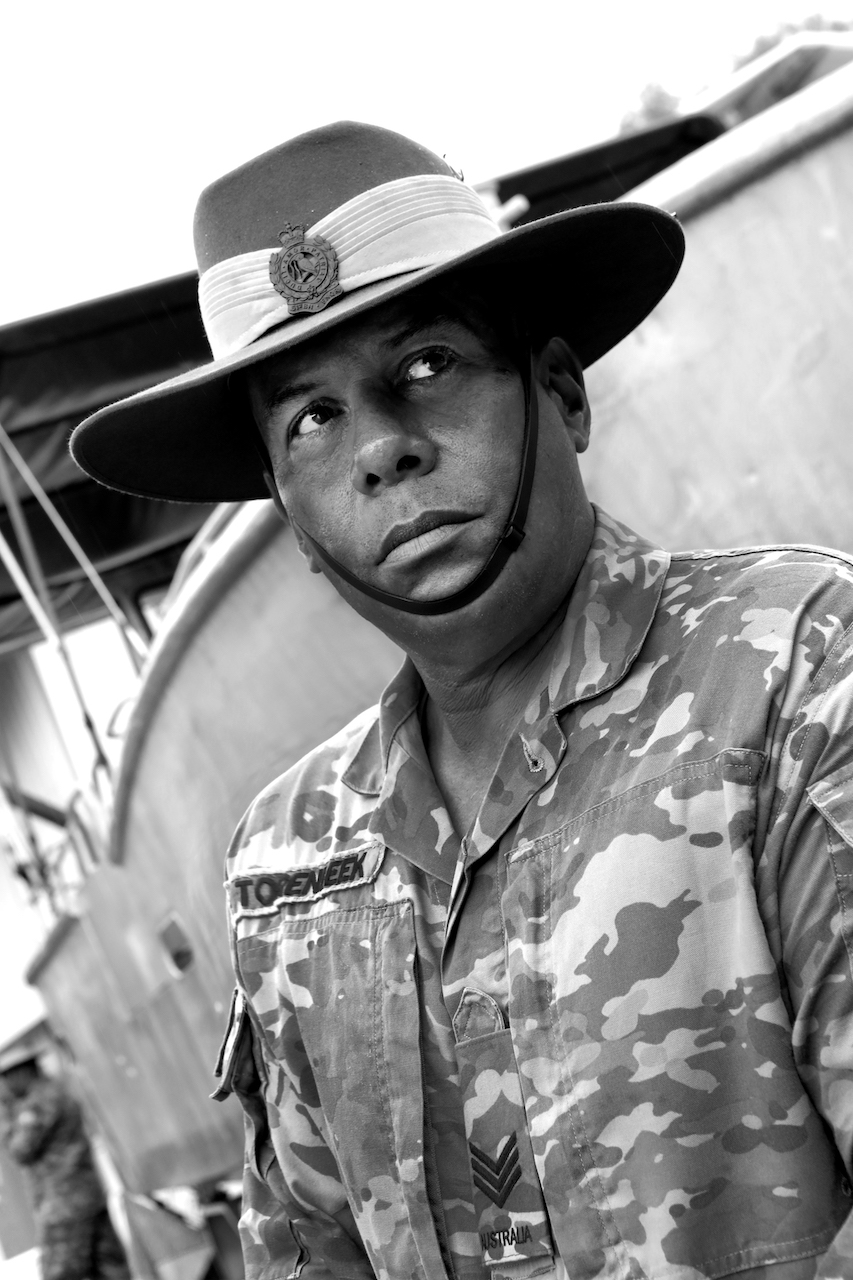Chris Torenbeek
Torres Strait Islands
Sergeant
51st Battalion, Far North Queensland Regiment
Regional Force Surveillance Group
Australian Army Reserve
Medals and Awards
Australian Operational Service Medal – Border Protection
Defence Long Service Medal
Australian Defence Medal
Soldiers Medallion for Exemplary Service
My Grandmother is from Erub Island, while my grandfather was blackbirded from Niue Island in Polynesia to work in the Queensland cane fields and then as a pearl diver on the pearling lugger vessels. He made his way from being a pearl diver to becoming the captain of a ship. When he saw my grandmother, he was too shy to speak to her, so he got a crew member to send her a note. They moved to Moa Island and had 13 children, and Mum was their fourth child. I have lived on Moa Island all my life; we use boats to travel across the sea for different events, such as tombstones, weddings, picking up families, and shopping. When you are on the sea, there is peace – all you hear is the wind and the sea. You make your own path across the sea; there is a sense of freedom that is hard to explain. But – I have been haunted by the memories of community members who have been lost at sea and never found. When I began conducting border protection in 2001, it was to protect Australia’s flora and fauna, stop illegal imports and exports, and prevent illegal immigration, as well as stop illegal fishing as prescribed by the 1982 United Nations Convention on the Law of the Sea. We patrol all of the Torres Strait Economic Exclusion Zone (EEZ). That’s around 294 miles off Australia’s coastline – and the whole of Australia is protected like this. My main reason for joining the Army was to gain skills through training that I could use in civilian life. In the military, it is all about safety, whether you are in the Regular Army or in the Reserves, and I have been in both. With these skills, people respect you because you have served your country and they trust you in the workplace and in the wider community. I want to set an example for my community as a role model of how to travel and coordinate safety at sea. In the Torres Strait, the tides are really strong, so you have to understand and respect the ocean to navigate it. I have now achieved a long-held ambition and have commenced working as a Marine Tactical officer (MTO) with the Australian Border Force.
I use social media to show where and how I choose to go around the Islands. So, every time I travel from Moa to Thursday or another of the Islands, I post photos of where I am going on Facebook. What I am actually doing is making an activity safety brief for the community, as we do not have a voluntary marine rescue in our community like on the mainland. On the mainland, the maritime rescue requires you to provide your movements so they can find you if something goes wrong. But we don’t have that service, so I use social media to show that I am wearing my life jacket and safety gear. I do this so people know not only where I am but also show them how I stay safe at sea. I do a halfway line report, just like in the Army, with time-stamped photos of what known reef I am near and the GPS coordinates and snail trail of where I’ve been and where I am going. It looks like I am just sending posts, but I’m not really – I’m making sure if the sea gets rough and something unexpected happens, I can be rescued. I also carry a personal EPIRB on my belt – it’s an emergency position-indicating radio beacon that works by satellite. I also call relatives for a chat on my way back home, but I also let them know where I am and when they should expect me home. The process I use is very similar to how we communicate in the military, whether it’s on land or sea. Just like my family, my Army boss will also call to check that I am on time and not lost at sea. I have two sons; one is about to join the Army, and the other, who is not in his teens yet, is in the Cadets. I share stories about my experiences and tell them what they can expect and what they will gain. Often I find myself in a shop buying them simple survival tools or boots that will help them out bush – and I have even bought them a personal EPIRB each! I feel very proud of them and support them in every way I can.




